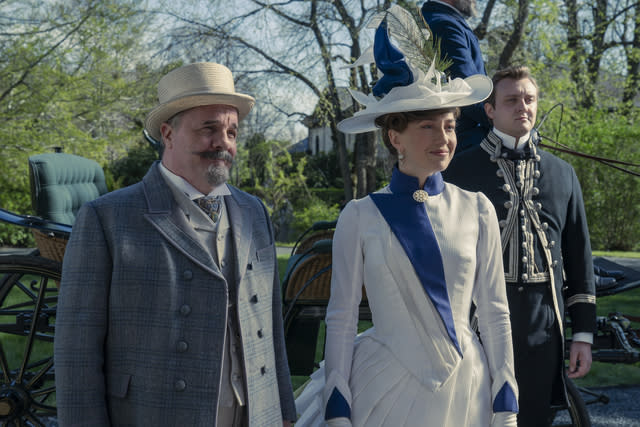This ‘Gilded Age’ Character Was a Wild, Tea-Spilling Real Person

- Oops!Something went wrong.Please try again later.
“The Gilded Age” creator Julian Fellowes has never shied away from incorporating real history into his collection of soapy, dramatic costume dramas. The entire conflict of “Downton Abbey” occurs because the agreed-upon heir to the Crawley estate died on the Titanic and “Belgravia’s” events hedge on the documented confusion at the Duchess of Richmond’s ball, famously interrupted by an announcement that called away most of the present men to fight in the Battle of Waterloo. “The Gilded Age,” however, is the first to inject its story with real historical figures whose actions drive the narrative in huge ways. Notably, it makes a real-life person from 19th century New York its secret villain. Or hero, depending on perspective.
That character is Ward McAllister, the mustachioed Southerner with a Benoit Blanc accent and Mrs. Astor’s ear, played to campy perfection by stage and screen legend Nathan Lane. When McAllister first appeared in Season 1 of “The Gilded Age,” it was easy to assume that such an over-the-top presence indicated one of Fellowes’ fictional fancies, but no. If anything, McAllister was toned down from his historical role in Season 1, though his actions in Season 2 hint much more closely at his actual motives.
More from IndieWire
'Curb Your Enthusiasm' Is Ending with Upcoming Season 12 - for Real
'The Gilded Age' Artisans Are Channeling Their Inner Berthas
In history, Ward McAllister served the same role he does on “The Gilded Age.” He was a self-appointed guardian of the veil between the wealthy elite and the merely wealthy, and often acted as a guide or coach to new money families he deemed worthy of entering high society. He achieved this role by being a stubborn little weirdo who faked it until he made it, using money earned from a mining law firm in California to send himself to Britain and Europe, where he absorbed every aspect of the high life and returned to America insisting that he was the authority on how to be the right kind of rich.
And everyone bought it! At first. McAllister’s outsized role in society made him a celebrity, but the attention and power that came with having veto power over the social lives of the rich went to his head. Clearly thinking himself untouchable, he published a book in 1890 titled “Society As I Have Found It,” which is both available from many public institutions for free in PDF form and one of the most stunning examples of social self-sabotage imaginable.
Though “The Gilded Age” takes place in a much more stratified and regimented period of American history, the general rules for being rich and cool haven’t changed all that much. Don’t act desperate, don’t talk about money, and just, like, be chill, man. Ward McAllister’s book violated all of these rules. Big time.

In “Society As I Have Found It,” McAllister is more desperate than a Taylor Swift fan ten dollars short of buying a ticket to the Eras Tour. He name drops obsessively, mentioning families and figures that would be familiar to “The Gilded Age” watchers and general history lovers: President and Mrs. Martin Van Buren, the Morgan family (Marion’s drunk suitor at the Newport Casino is a Morgan), Mrs. Fish, the Astors, and Marion Brook’s own grand-maternal family, the Livingstons.
After dropping such names, he spills tea that is historically interesting but must have been mind-numbingly boring at the time. One time, a Duke chased a turkey. Mrs. Astor’s carriage got stuck in a riverbed and she told everyone how to get it out. A woman asked McAllister to throw a picnic. It’s all inane with one exception: when McAllister describes an elaborate party decorated with aggressive Brooklyn swans who started fighting each other in the middle of dinner, which is just funny.
McAllister also expected his readers to believe that someone often sent him anonymous poetry about his parties, peppering the narrative with lines like “Clams, clams, clams! I have nothing but clams on the brain!” after a successful Newport clambake and another set declaring him “the Autocrat of drawing rooms,” which had to be the most “kid in high school who tries to give himself a cool nickname but fails”-ass moment of the century.
Finally, McAllister committed the mortal sin of telling the world how much his tony friends spend on their lifestyles, outing the ridiculousness of spending the modern equivalent of $234,863 on the aforementioned swan party, $5,871 on dinner, and $20,339 on one of the picnics that woman asked for. All while receiving $200K+ in tax returns, so at least that hasn’t changed.
McAllister’s book was received with mockery that not only extended to him, but the entire society he described. The New York Times review of “Society As I Have Found It” from October 19, 1890 says it best:
“The degree of fervor that the author puts into undertakings that adults commonly leave to adolescents is really wonderful.”
“His words should not in all cases be such as writers of grammars and dictionaries cannot conscientiously sanction.”
[After describing an apocryphal story wherein someone is referred to as “the greatest ass who ever existed.”] “This story bears its relation to the literary work under review.”
And “No suspicion that he is making a continental laughingstock of himself must disturb his mind…it would be fatal to him. In this volume, there is no trace of any such suspicion.”
Needless to say, Ward McAllister’s book didn’t go over well with his society friends. While he remained a figure in New York past its publication, founding a club that threw some of the most exclusive balls of the early 1890s, his level of access to the world of the high and mighty was done. When he died in 1895, Mrs. Astor skipped his funeral and a member of that party-throwing club was quoted as saying “Poor McAllister. What a pity he wrote a book!”
On one hand, spending years among rich, secretive people only to call out everything stupid about their lives in an attempt to make oneself seem super cool and important is a crummy thing to do. It certainly puts some of Mr. McAllister’s actions in “The Gilded Age” — keeping tabs on the Russells, clinging to Mrs. Astor, playing both sides of the Opera War — into perspective. To these characters and their historical counterparts, Ward McAllister is a villain in the making.
However, people who spent the cost of a literal house on a Thunderdome for swans absolutely had it coming. Hero or villain, keep an eye on Ward McAllister. Both the Gilded Age and “The Gilded Age” wouldn’t be the same without him.
Best of IndieWire
Where to Watch This Week's New Movies, Including 'Wonka' and 'The Zone of Interest'
2023 Movies Shot on Film: From 'Oppenheimer' to 'Killers of the Flower Moon' and 'Maestro'
Quentin Tarantino's Favorite Movies: 59 Films the Director Wants You to See
Sign up for Indiewire's Newsletter. For the latest news, follow us on Facebook, Twitter, and Instagram.

